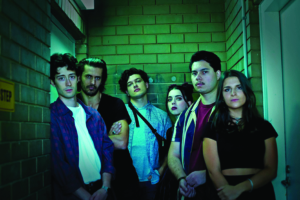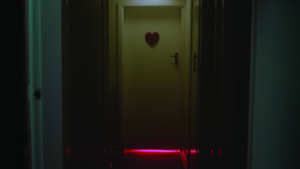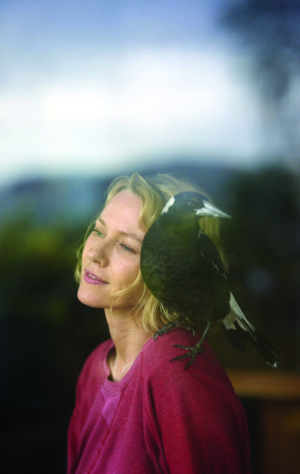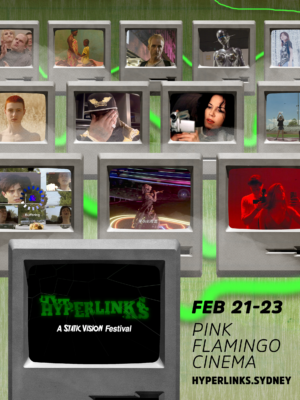How does an author feel when he sees his written words transformed into full color images up there on the screen?
Thomas Keneally agreed to discuss his feelings about Fred Schepisi’s realization of his novel The Chant of Jimmie Blacksmith. A time was set for the interview: it was to be recorded in Sydney immediately after the first screening of the fine cut to the film’s backers and distributors. Although Thomas had acted in a minor role in The Chant, and he had been consulted regularly by the director, this was his first viewing of the completed film. But when the lights came up after the first screening, the author asked to defer the interview: ‘I’m just too overwhelmed to make sense of the experience at this stage’.
A month or so later he offered to talk to Metro. Peter Hamilton began the interview by asking Thomas Keneally why he had been so reluctant to talk about Jimmie Blacksmith after his first viewing.
What interested me was that having seen the film of your own book, you felt quite unable to talk about it. I’m interested in why a film would make that sort of impact on the author of the book on which it was based.
Well, one of the reasons is that people change and it’s seven years since I wrote that book, when my attitude to life was conditioned by a hell of a lot of different circumstances from the ones I’m in now. It was a shock to find the book realised for that reason. I think that this is something people don’t understand about writers – even about really important writers which I don’t claim to be. They go on growing just like other humans. The way that you can feel dissociation from the human you were ten years ago, so can a writer feel disapproval of the book he wrote ten years ago. The other interesting thing is that I’ve never met a writer that read his book after publication. It’s too much of a threat. It’s just the facts of the physical and technical conditions under which a book is published. The book is finished. A year later, at best, the book is published. By then you’ve probably changed. You’re certainly on to something new, and you’re certainly more obsessed with the something new than you are with this old stuff.
What were the conditions prevailing in your life at the time of the writing of Jimmie Blacksmith that have passed?
Well, they were personal ones, but they made me rather blacker than I am now. One of the things that I didn’t fully realise is the vehemence of my condemnation of the white settlers. In the book I portrayed them as the sort of mean, northern England, Scottish and Irish peasantry who having had the stuffing beaten out of them in the old world came to Australia where they are more or less glad to have the aborigines to whom they can do what was done to them at home. I think the tone of the thing would be different if I were writing the book today.
When you’re going through a period of whatever you want to call it – dark night or suffering or something – your attitude towards the human race is radically different. Two things have happened since then: I’ve gone on to writing books that are basically straightforward commercial, like Season in Purgatory. Others are more artistic efforts, but even those are much more affirmative in tone than a thing like Jimmie Blacksmith. I still think though that Jimmie Blacksmith sums up an immense event involving the Governor Brothers, an immense symbolic event in Australia’s history. But the reason I was therefore shocked was to find the book realised. I found that a shock, to find the book realised all over again eight years after it’s been published.
The second thing I found a shock was the bigness of the screen.
You see you’re talking to people in this interview for whom very likely film is a primary and powerful medium. But in my childhood it wasn’t a credible medium for any statement about Australia at all. If anyone thought about any medium at all when I was a child it was to be a novelist but even that was a bit preposterous for an Australia, it was far better to stick to cricket and growing wool and so on. Therefore, like most Australians my age, I don’t have this filmic background that kids take for granted now. A simple distinction I’m sure was that in my day amongst artistic sort of kids the aim was to write a great novel, not even a great Australian novel – our nationalism hadn’t developed to that point and our education system hadn’t developed to that point. Amongst children now I’m sure the aim is to become a movie director and make a significant Australian movie.
Today that’s a far more common aim than to write an important novel. Therefore to me film is still partly magic, it’s still part of the Vogue Homebush N.S.W. on Saturday afternoon. Although I’ve learnt that all the things that dazzled me when I was a child were done technically, I still revert to that sort of filmically illiterate child whenever I see a film that works. And Schepisi’s film, no matter what reservations I might have, knocked me out in that way.
It’s a physical thing too; when you write a book it’s so small, you’re writing on a page as big as this page here which is beside the microphone which measures 8” by maybe 12” at the most. It’s such a small world, it’s such an unpictorial world that you’re dealing with when you write a book. It’s so private too, it hasn’t been published yet. When you’re writing it you’re not envisaging something that is going to stand between covers forever and maybe made into a movie. So the transfer between that small page and the size of the cinema screen, that itself is a big transfer, and one that would tend to take the breath away.
I’ve thought that a writer is dealing very much with mental images and that it must be a huge problem to see these quite subjective images made very fast and very specific on the screen. Were there instances of that in your reaction to Jimmie Blacksmith?
No. One of the things that shocked me about the movie was that I felt it was close to the book. Since I developed this slightly ambivalent feeling towards the book I reacted to the extent to which Schepisi was loyal to the book and he was extremely loyal. I remember seeing a copy of Jimmie Blacksmith which he had been working on. He has used a series of see-through coloured pencils to underline things that were scenic, things that were visual images, things that had to be said in dialogue and so on. There was a series of three or four colors running through the entire book. It seemed to me that he knew the book immensely more than I did. I was impressed by this. I was also a little humbled and alarmed by it, like the way a child feels maybe when he tells his parents something misleading about what he wants and they react accordingly. It’s always a shock to find your work being taken seriously and Schepisi certainly took it extremely seriously. I can recommend him for that extreme conscientiousness to any Australian writer. If he wants to make someone’s book into a film, it will be very close in tone and intent to the book. I know that from having seen the movie.
Now it was my feelings about the book that partly weighed to me that afternoon, and it was the bigness of the screen. If I might interpret some other reactions, I think Tommy Lewis was in that state too — the boy who plays Jimmie Blacksmith in the movie. He was I think the phrase is ‘bombed out’ by it too, shocked by the immensity of his actions as they came out. No one acting even in a movie sees their actions as so immense. His background was like Jimmie Blacksmith’s, a tribal halfcast, and he probably has the feelings that all humans have about the strangeness of murdering women. I felt he was a little overborne and shattered by the experience of seeing the movie.
So these were the grounds for my inability to speak about my reaction to the film earlier than this.
But what are your reservations about Fred Schepisi’s realization of your novel?
I have already adumbrated some of them to Schepisi. There are inevitable changes that occur when you let your work go. It does not worry me and I don’t think it should worry a novelist terribly. Graham Greene never seems to worry about what has been done to his books. But I felt, for example, that some of the dialogue was an uneasy mix of mid-twentieth century black power and genuine aboriginal fringe dwelling talk, the sort of language of people who live on the fringes of Armadale or Moree or Kempsey, and the language which they were probably using in 1900. I think there is a slight tendency to abstract from that event of 1900 and put a black power relevance on what happened in 1900 and to use the terms of black power at a stage of history when they would not have consciously been used by anyone. But that is inevitable and here we run up against one of the dilemmas of the movie maker, novelist and so on, which is: is he really going to achieve complete verisimilitude with the age with which he deals, or is he going to use a language and idiom which have immediate relevance to the people who are going to watch the movie. Therefore these reservations I have probably are warrantable and honest and possibly due to the director’s ultimately successful attempt to come to terms with the fact that you are telling an ancient story to people in 1978, most of whom have never met an aboriginal, who are more familiar with statements they have seen on television uttered by black people than they are with the sort of small town fringe-dwelling aboriginal dialect.
Were you consulted as an author at all during the scripting process?
Well one of the interesting things about Schepisi is, I suppose about most movie makers, is that the script is not fixed. There is a tendency, and it worked extremely well in The Devil’s Playground and is likely to work extremely well in this one, to rewrite the script on the morning or during the lunch hour before the scene is shot. I guess that there are a number of reasons why this should be so. One is that before the shooting starts, a Director doesn’t know how the story and character are going to be interpreted. Although Schepisi is an extremely directorial director in that he knows the effects he wants, and in that he is extremely good at getting them from amateurs or from people who have never acted professionally, still he inevitably gets surprises as anyone will because humans are unpredictable. He shows a marked lack of egotism by adapting his fine scripts to suggestions from the crew and also in response to the way the movie has been going on location.
I find that a very disarming process, a very enviable process. A novelist writes completely on his own and he cannot write any other way, it’s a long process and solitary and to have this feed-in leading to a rewrite at lunch time, or at the start of the day, or late the night before is amazing. Naturally, ultimately the Director or someone has to get all on their own and write it, but in writing it he is dealing with a series of leads and themes that have been coming to him all day. I find that a wonderful communal and stimulating way to work. One of the marks of writing a novel is that you give out continually and get no feed back, because there is no other human there to give you feed back, there is no other human in immediate contact with what you are doing. Whereas in moviemaking there is immediate feedback to whatever you do. Whether you are the sound man, the camera man, the Director or the actor, there is an immediate feedback. Therefore as one who tends to be a vicarious person and who became to be a novelist almost by accident, I look upon moviemaking as a sort of tribal celebration and I admire the way someone like Schepisi works for that reason, especially his openness in that regard. For example, some of the greatest novelists in Australian history, people like Patrick White and Hal Porter, some of the greatest writers I should perhaps say operate on a sort of quod scripsi principle, which is Latin for “what I have written I have written, Let no one change it”, whereas a movie maker is wide open and it is a tribal process. It is the tribe he has hired and on location with him. That to a novelist is another thing about movie making. I so enjoyed watching that Truffaut movie about the making of a film, Day for Night, it rang so true, even with the two Australian movies that I have been associated with. The tribal nature of making a movie and the sort of whole reality about people being geared to that movie.
I am sure that anyone who has a sort of gypsy tendency, anyone who wants intense and transient relationships, the movie industry is absolutely made for them.
And are they the qualities of the cinema that make Thomas Keneally absolutely suited to the Australian movie industry?
I don’t think so. I doubt whether I will be associated with any more movies but those qualities do have appeal. Quite frankly I don’t know about other people’s families but my family ended up here at the end process of a series of wanderings, so I think there is this wandering gypsy characteristic about Australians. They are great travellers and transients even within their own country. There is a side of us that calls out for this continuing changing intensity, and the movie industry compared to the writing of novels has this immense attraction about it — an intense coming together to produce a miraculous effect, during which one person puts in a suggestion and another reacts to it, every one gets more and more excited. Whereas in the writing of a novel, the novelist gets less and less excited because he is giving out more and more. No one is saying anything in reply to his thesis, no one read the book until he’s finished the wretched thing, because he is not game to test it out on anyone, especially in the first draft which is always deplorable, unreadable. I see a radical difference between the two art forms and you can gauge that I have a prejudice towards movie making. But there is this other difference that you don’t have the industrial problems of controlling other people’s egos when you are writing a novel; a novelist is in a position of power, the novelist doesn’t have trouble controlling his characters even though some of them run away. He can adapt them and so on. But the gift that is needed for movie making quite obviously is a gift for galvanising and productively controlling a great number of highly skilled people, who are working all around you. I am amazed that two art forms whose ultimate result are so similar could be so disparate in the human realities of how they are produced.
It is a wonderful quality of the Australian movie industry that it is so small you can cross these barriers, and you can have extremely literate directors who are interested in the writer’s viewpoint. The American movie industry doesn’t have that tradition, because it has been so commercial. The writer to them is someone who is going to come in and insist that his original vision be retained. Whereas they feel if his original vision is retained “God help the box office!”
Let’s return to your reservations, small as they are, about Schepisi’s film. The first one was the language of the aboriginal characters. What were some of the other problems as you saw them?
Well I reacted critically to one incident in the movie. An incident of maybe three or four seconds when Jimmie Blacksmith said what he is about. It is a mistake that every novelist makes. We have been talking all week-end here at the conference about the secret of never saying what you are trying to prove, of proving it by selection of materials. I mentioned my criticism to Schepisi and Schepisi said “that’s the truth”. He wrote that scene, amended it and then it was performed and then most of it was cut out by the editor and just this tiny sentence left in. He agrees. He says it’s too late. This is the other thing about all the arts, the business of it being sometimes too late before you are aware that something must be changed. When the thing has been finally cut as it has in the filmic sense in terms of the footage, the film has been finally cut as it has at the time of this interview, at that stage it is too late to change.
The same thing happens with writers. By the time they have finished with the book, they are bored with it, they rush it off to the publisher for a reaction and also because they might need an advance to pay their grocery bills, the overdraft, or whatever diverse needs a novelist might have. Then it might be months later when they are reading it in proof form and it’s too late, that they see there is something wrong.
The afternoon Schepisi saw the final cut of his movie with a sort of rough sound track, it’s very akin to me to the day when the contract with the publisher is being signed, months have passed and suddenly a set of galley proofs, print run-offs of your book arrive wherever you happen to be living and you have to correct them. But the possibilities of correcting them are so limited. I mean if you replace one line on the page it has to be replaced by another line of exactly the same length. If you change a word you have to make sure that it won’t alter the contour of the paragraph. Each printed page has been set up and is ready to roll and if you find out that something is drastically wrong, it might only be a page and a half, as far as you are concerned it is like a sore thumb, then it’s already too late, you just have to bear it.
Much later when it’s published and people complain about that page and a half, expecting that you are going to defend it, they get a surprise when they find out that it remains there as a result of a process. When I mentioned this moment to Schepisi when Jimmie Blacksmith in a great rain forest says what the movie is about, ripping the tribal aboriginal off, I am sure he was in the same position as I have been when I have seen a couple of paragraphs that are terrible and betray the book but are too late to change.
The Australian movie director, as I have seen him from the outside, is under an immense onus. He has to control all these people, some of whom are not as well trained or as individually efficient as people in other movie industries. That is no criticism of them. It stands to reason that because the industry is just developing, it’s experience isn’t as great as that available to directors in the French movie industry or the American movie industry. Another thing is that our directors have to raise the money which many overseas directors do not have to do. Some overseas directors decide to produce themselves, but generally the raising of the money must be such a creative effort in Australia, that itself must be exhausting. They have written a script, or as in Schepisi’s case they have a script that they have written themselves, they get the money together, they have to do the casting and find the locations and then make the movie. By the time the first foot is shot, by the time the first camera button is pressed, demands on the Australian directors sanity and time have already been a menace.
I think it’s a miracle and an indication of something very good about Australia, that so many good films are being made, given those barbarous destructive conditions. I am sure any idiot, myself included, could make a very good American movie or French movie, if you had the right cameraman and if you had all the production crew lifted from your shoulders, if you had people who were production wizards, all about raising money and all you had to do is turn up in the morning and mumble a bit to the actors and cameraman, it would be a dream. This struck me as an outsider, the different weight of tasks that are on an Australian movie director, that is not on the rest of the world, and yet he is expected to succeed more considerably than an overseas director. I think Australian movie directors are either ego maniacs or heroic or a little bit of both. It is the tragedy of a small country that all things have to be done on this intense basis in Australia, and particularly in connection with this movie, there is a wait of cultural expectation, which would destroy a lesser man.
May I say that I sympathise with the onus being placed on Schepisi, in any other country a director has just got to make a movie. Here he has to make a major contribution to the Australian cinema. I think that’s crazy. I think it’s time we dropped that habit. It’s only an extension of all the insecurity we have ever suffered from.
How do you think the public will accept the film?
I cannot judge because I have only seen it that one day. I spent the whole time watching it thinking, ‘my God I am responsible for this’ and you cannot judge a movie in those terms. I suspect from all the people whose opinions I respect that I have heard from so far, including Schepisi himself, that it is extremely successful. Schepisi said to me afterwards (Schepisi is an extremely sane man), I feel that I have achieved somewhere in excess of 80% of what I was trying for. Well now if that is the case then it must be a very good and a very important movie.
You don’t fear that the image of a wild, homicidal black will reinforce prejudice against Blacks?
No, my fears were entirely the opposite. My fears were that it was more likely to spark a direct aboriginal reaction than to create prejudice. I felt from seeing the movie that the least of my problems was whether his grievance was proved. Now apart from being aboriginal, Jimmie Blacksmith in the movie and I hope in the book is an individual like Ned Kelly and Ned Kelly one day shot a relatively innocent policeman and found that he was a killer beneath it all. That is an experience a lot of people have, an experience a lot of Australians have had in war and Jimmie Blacksmith as an individual discovers this.
I plead guilty to being wrong but it wasn’t an apprehension that entered my mind. I plead guilty to the possibility of maybe being wrong. I didn’t feel for a moment that it was the sort of movie which if seen in Moree would make whites say ‘we always knew they were thieving murderers and bastards.’ Quite the opposite!
I called up Rhonda Schepisi the next morning and spoke to her about my fears that in fact it might cause a reaction in exactly the opposite direction, that it might be used as a sort of call to militancy amongst the urban aboriginals who are suffering intensely and as badly as Jimmie Blacksmith ever suffered.





